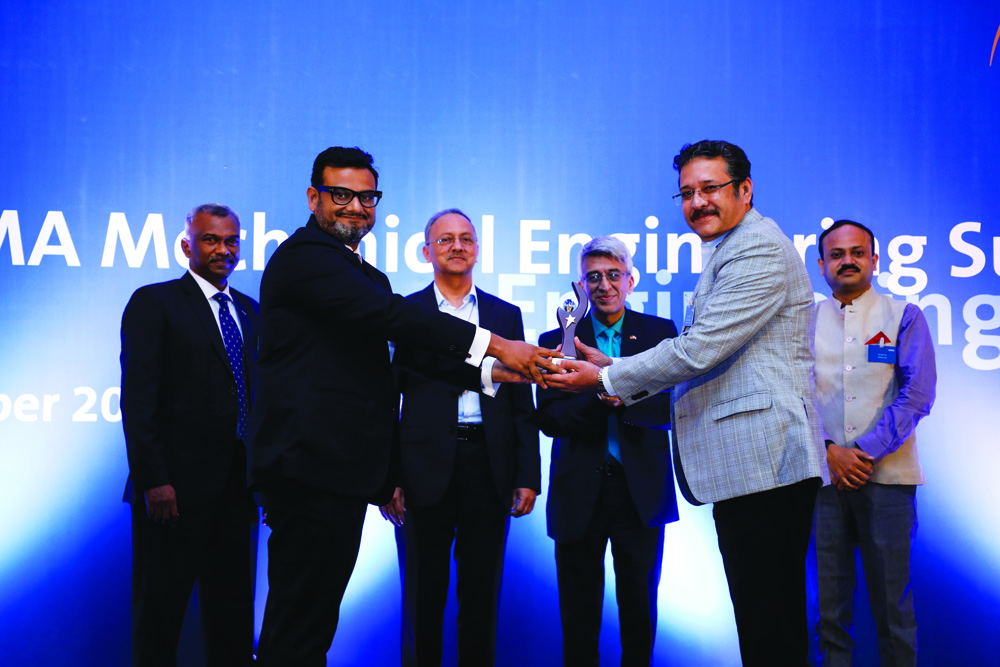Impetus for Self-reliant Manufacturing

It is critical to assess the impact of the nationwide lockdowns and the challenges that the manufacturing industry faces to stand strong and become self-sufficient. VDMA India deliberated on this need and much more in its flagship event. A report…
The Government’s impetus and policies, strategic ties, smart manufacturing trends, and focus on accelerated digitalization and localization are called upon for deliberations. Touching upon these points, the 10th VDMA Mechanical Engineering Summit, VDMA India’s annual flagship event, was held on October 8, 2021, at the Hotel Sheraton Grand Bangalore, drawing over 260 participants from 17 Indian cities.
Welcoming the audience, Rajesh Nath, Managing Director, VDMA India, explained the impacts on the economy and the business situation during the lockdowns and the second wave of the COVID-19 pandemic. He also gave glimpses of the improvement in the circumstances currently happening.
He further elaborated on some of VDMA India’s key activities for the current year 2021, such as organizing the Additive Manufacturing Symposium, the first VDMA symposium after the second wave of the pandemic, followed by ‘Emerging Technology Trends in Manufacturing Processes’ at Pune and Bangalore, the North India Members Meet, and the recent German Technology Day symposium at Ranchi. He stated that the VDMA India team has completed over 100 webinars with over 15,000 participants since the initial lockdown.
The Guest of Honour, Achim Burkart, Consulate General of the Federal Republic of Germany, Bangalore, spoke on the ‘Indo-German Relations: Prospective Business Synergies & Government Support’.
In his special address, the Guest of Honour, Kamal Bali, President & Managing Director, Volvo Group, India, focused on the ‘Transformation of Manufacturing in India’ and emphasized the importance of small- and medium-sized enterprises (SMEs) and the Manufacturing sector in creating job opportunities and contributing to the GDP, making India a US$5 trillion economy. He stated that the current situation in India is the best time for the Manufacturing sector, owing to the implementation of Government policies such as the Product-linked Incentive and GST, which are in place to improve the ease of doing business.
Impetus to manufacturing
Atish Laddha, Senior Associate, Indirect Taxation, Roedl & Partner India Pvt Ltd, spoke on ‘Government Incentives and Subsidies- Unwrap the gifts on your desks’, highlighting manufacturing incentives, GST refunds, state industrial policies, customer bonded warehouse policies, and the EPCG Scheme (Export Promotion Capital Goods Scheme).
In his presentation on ‘Ease of Doing Business in Tamil Nadu State’, Aditya Nagarajan - Vice President, Investment Promotion, Guidance Tamil Nadu, Industries Department, Government of Tamil Nadu, elaborated on the future investment opportunities in Tamil Nadu as an export market for German companies.
Umesh Pai, Managing Director, EPLAN Software & Services Pvt Ltd, spoke on the ‘Digitalized Future of the Industrial Ecosystem- It’s in Your Hands’. He discussed the digitalization process as well as the tectonic shift in manufacturing over the last 15 years in the context of operational management.
The ‘Summit Special’ issue and knowledge paper by BDB India titled ‘Government incentives for Emerging Opportunities – Atmanirbhar Bharat & PLI Scheme’ was also released at the event.
Future smart manufacturing trends
Sreekanta Aradhya, Global Head – Connected Industries Business Area, Robert Bosch Engineering & Business Solutions, spoke on ‘Seize the I4.0 Opportunity – Onboard the Digital Transformation Journey’. He highlighted the digitalization process from a ‘Bosch perspective’, as well as a comprehensive road map for companies just starting on their transformational journey.
Prashanth Uppunda, Technology & Innovation Topics Leader, SIEMENS Technology & Services Pvt Ltd, assessed ‘Autonomous Factories – Reality or Myth’. Speaking on autonomous factories which are unavoidable and how even small companies can take a step towards autonomous manufacturing, he added, “Now, we tell our robots what to do and how to do but, tomorrow we will tell our robots what to do, and they will decide how to.”
Citing several examples of how SAP’s digital factories have helped companies turn around their shop floors, Sumantha Chakraborty, Senior Project Manager, SAP India, touched upon various use cases and real-world examples of ‘Digital Transformation on the Shop Floor’.
Indian economic reforms
A panel discussion on ‘Economic Reforms in the Last Three Decades – Make in India 2.0’ was moderated by Nath. Speakers such as Rohit Bhagade, Chief Financial Officer, SAP India Subcontinent; VG Sakthikumar, Managing Director, Schwing Stetter India; Prashanth Doreswamy, Country Head & Managing Director, Continental Automotive India; Ravi Agarwal, Managing Director, Pepperl+Fuchs Factory Automation; Ulrich Greiner Pachter, CEO & Managing Director, SMS India Pvt Ltd; and Wilson Thomas, Managing Director, Carl Zeiss India, presented their perspective on the topic.
When asked to elaborate on the Insolvency & Bankruptcy Code (IBC) and how it has helped the Indian Manufacturing sector, Bhagade elucidated that the IBC is a game-changer and a step in the right direction for companies under distress due to its sheer transparency in timelines. The policy has also benefited the banking system, with India’s Ease of Doing Business index rising from 136th to 66th in just five years. Sakthikumar added that India’s ‘single tax’ GST policy benefits both the Government and foreign investors in terms of ease of doing business.
Speaking on the benefits India's MSME sector can receive, Doreswamy said that when Non-Banking Financial Companies (NBFCs) are considered, the MSME sector will benefit. Similarly, Agarwal stated that the Emergency Credit Line Guarantee Scheme (ECLGS), as well as the speed and transparency with which it was implemented, is a significant enabler for India’s export growth.
Concerning the New Labor Codes implemented, Thomas stated that large companies generally follow these guidelines and would have no trouble accommodating these reforms. However, he added, MSMEs would require some time to restructure their policies. In any case, these codes are the way forward to ensure employees a stable income and security.
Make in India 2.0 and Atmanirbhar Bharat were elevated in the second round of the panel discussion by pursuing policies that are efficient, competitive, and resilient, as well as self-sustaining and self-generating. The PLI scheme, as per Doreswamy, has accelerated investments in the Automotive sector, with nearly `3.5 lakh crore allotted for PLIs, and `56,000 crore dedicated to the Automotive sector.
A strong infrastructure growth is required to achieve India's ambiguous goal of becoming a US$5 trillion economy by 2025. Sakthikumar explained that the National Infrastructure Pipeline Project has been in full swing since its inception in 2020. The Government is concentrating on the Transportation and Power sectors, while the Construction industry is gaining traction.
Awards
VDMA India, in collaboration with Rödl & Partner, conferred the fourth VDMA Manufacturing Excellence Awards under two categories. Vulkan Technologies and Micro Precision Products shared the ‘Energy Efficiency and Conservation Award’ for the ‘Medium Category,’ while Zahoransky Moulds & Machines finished second. Continental Automotive Components won in the ‘Large category,’ with Truetzschler India coming in as the runner-up.
R Stahl won the ‘Work Condition and Work Safety Award’ in the ‘Medium category,’ with Kern-Liebers India coming in second. Daimler India Commercial Vehicles India was the winner in the ‘Large category’ and Bosch was the runner-up.

Sovan Tudu
Sub-Editor
Magic Wand Media Inc
Sovan.tudu@magicwandmedia.in
Source: VDMA India



 Facebook
Facebook.png) Twitter
Twitter Linkedin
Linkedin Subscribe
Subscribe